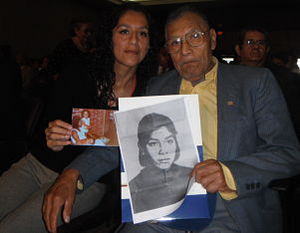
By Nancy Bronstein
In a ruling hailed as a victory for Guatemalan civil war victims, the Inter-American Court of Human Rights, a judicial body of the Organization of American States, has condemned Guatemala for its actions related to 28 forced disappearances. The ruling “dignifies the victims’ struggle for justice” says Roxanna Altholz ’99 of Berkeley Law’s International Human Rights Law Clinic (IHRLC), which litigated the case along with the Myrna Mack Foundation, a human rights organization based in Guatemala City.
The ruling, announced on December 21, 2012, held that upper echelons of the Guatemalan military conspired with politicians and police to target and eliminate the “disappeared” victims due to their perceived political and social views. According to the Court, the disappearances were carried out during the early 1980s in accordance with a state policy designed to protect national security. This brutal policy led to the disappearance of more than 40,000 Guatemalan men, women, and children during that country’s 36-year civil war (1960-1996).
The Court found that Guatemala had not only abducted, tortured, and secretly executed the victims, but violated the rights of their family members by subjecting the victims’ relatives to ongoing threats and intimidation, failing to investigate, and withholding information about the disappearances.
To provide redress for these violations of its treaty obligations, the Court ordered Guatemala to investigate, prosecute, and punish those responsible for the crimes, recover the victims’ remains, construct a national park dedicated to the memory of the victims, and pay more than $8 million in damages to the victims’ families. In accordance with Guatemala’s legal obligations under the American Convention on Human Rights, the Court’s orders are binding.
“This ruling doesn’t just monetize our clients’ suffering, it orders Guatemala to dignify their struggle and the memory of their loved ones,” said Altholz, associate director of IHRLC and lead counsel for the case. “Our clients have been fighting a tidal wave of injustice for more than 30 years. This ruling is their first legal taste of victory.”
With co-counsel and crucial assists from clinic students, Altholz represented a group of 127 family members of the disappeared, including parents, siblings, spouses, children, and grandchildren. The disappearances had profound and disastrous effects on the victims’ relatives; some were forced into exile, many suffered from depression, and others were attacked and injured or lost their lives as a result of their search for their missing loved ones.
“Without the dedication of clinic students, it would have been impossible for us to litigate 28 cases at once and provide our clients with the quality legal representation they deserved,” said Altholz. Since 2006, when IHRLC joined the case, more than two dozen Berkeley Law students have prepared for legal practice by working on the litigation under Altholz’s supervision. They conducted legal and factual research, reviewed thousands of pages of documentary evidence, interviewed family members and witnesses, and drafted legal submissions. Last May, four students traveled to Ecuador to participate in a daylong hearing before the Inter-American Court.
“This case is extremely important, particularly in Latin America, where many countries have experienced the same kinds of atrocities and victims and their families are still denied the right to truth and justice,” said Krystel AbiHabib (LL.M. ’11), who worked on the case during the spring of 2011. “I felt humbled by the trust the families put in us and in our work.” AbiHabib now lives in Chile, where she teaches and researches issues related to indigenous and human rights.
“This is the first time the Court issued a decision in a case with such strong forensic and documentary evidence about state participation in forced disappearances,” said Carmen Atkins ’08, who began working with the litigation team as a Berkeley Law student and, after graduation, continued on as an independent consultant. Now a human rights attorney, she works for an NGO in Ecuador representing victims before international human rights bodies.
Despite the wealth of evidence and a three-decade investigation, Guatemalan prosecutors and judges have failed to identify, prosecute, or punish a single suspect. The Inter-American Court criticized state prosecutors’ lack of diligence and rebuked Guatemala’s Ministry of Defense for obstructing the criminal investigation by concealing state documents related to the security forces’ criminal actions.
Despite Guatemalan officials’ efforts to withhold evidence, a military logbook was leaked in 1999; the 54-page document contains photos of 183 victims disappeared by security forces during the mid-1980s with coded references to their executions. In 2006, more than 80 million pages of police records were accidentally discovered in the basement of small police station. The trove of information includes thousands of pages of documents describing the police’s participation in the forced disappearances. In 2011, the remains of two of the 28 victims were recovered from a former military base located about 60 miles outside Guatemala City.
In February, Altholz will return to Guatemala to meet with clients and state officials and to participate in public events about the ruling. “We are now in a new phase of the proceeding during which the goal is to ensure Guatemala’s prompt compliance with the Court’s orders,” she said. “I feel energized by the ruling and the feeling of making a difference, which in my mind, is the best part of being a lawyer.”